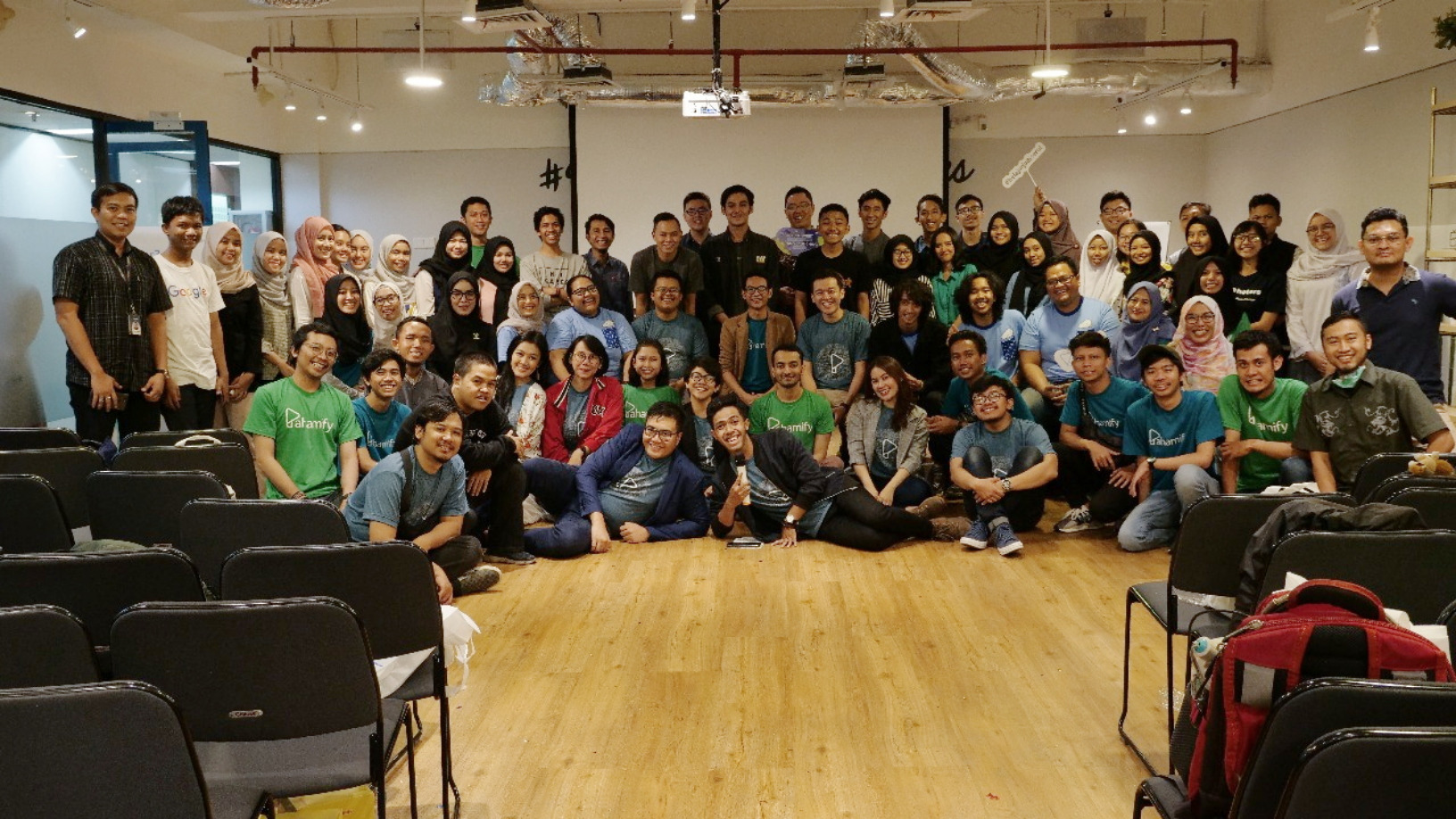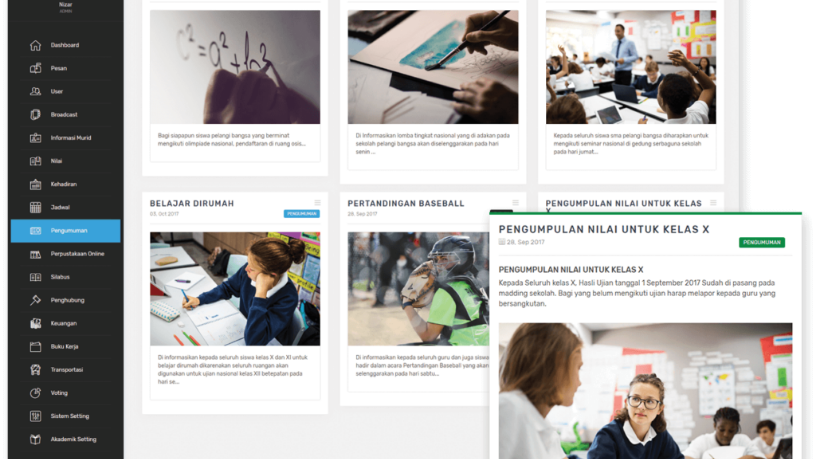Take Aristotle’s first principles thinking, throw in some "rockstar teachers" – and you get Pahamify, the edtech startup co-founded by Indonesian YouTube personality Rousyan Fikri.
Pahamify is an app that uses animation and interactive elements to recreate the excitement of discovery in learning – something Fikri realized was missing from most local edtech platforms. And so, as he has done for his 370,000 subscriber-strong YouTube channel, Hujan Tanda Tanya(or Raining Question Marks, in English), Fikri avoids simply uploading conventional school syllabi to Pahamify.
Instead it hires “rockstar teachers” who present course materials and engage students in a lively manner, verbally and visually. The startup's app aims for a dynamic and intuitive user interface (UI), and provides an engaging user experience (UX) via educational animations and games.
“We developed our technology for learning by using first principles thinking,” Fikri, the company’s CEO, said in an interview, referring to the Aristotelian approach of breaking down ideas or situations into its most basic parts until they cannot be deduced further, then building from there.
“Instead of copying well-known global edtech companies, we started by understanding the core problems faced by Indonesian students when it comes to learning. That is why our platform offers an integrated learning experience that not only helps students ace their exams, but also builds their intrinsic motivation and discover their inner talents,” he said.
Y Combinator alumnus
Pahamify currently has an average of 65,000 new sign-ups every month. Officially launched in July 2019, Pahamify had its start a few years earlier – in 2017, a year after Fikri's YouTube channel was launched and garnered over 12m views. By then, Fikri and Mohammad Ikhsan, the channel's executive producer, knew they had a winning formula. It was a natural step to translate that success to an app that can be used by a wider audience, and in an interactive way.
Game designer Edria Albert is Pahamify’s CTO, responsible for delivering the right balance of educational and entertaining content that is visually driven and interactive that will make Pahamify make a real difference in the Indonesian education system. The startup's name – a play on the Indonesian word for “fully understand,” represents that belief.
Fikri, who entered the prestigious Bandung Institute of Technology at aged 15 and graduated with a degree in Electrical Engineering at only 19 years old, described his team as one that has “high talent density – in technology, content and education.”
Pahamify's three co-founders, he explains, are all capable of both coding and creating content. “When a company has a clear product roadmap and strong technical capabilities, it can be efficient in delivering what users need," he said. “We don’t need to follow the hype or rely on gimmicks. We just have to come up with the right product.”
Pahamify currently has course material only for senior high school students, but it plans to use the $150,000 it received from Y Combinator from its latest funding round in March 2020 to work on creating material for elementary and junior high school students this year.
Test-focused, too
Fikri was pursuing his PhD studies at the Nanyang Technological University in Singapore, where he met fellow Indonesian Mohammad Ikhsan, who was also a PhD student, researching in control, intelligent systems and robotics at the National University of Singapore. Both were teaching assistants as part of their studies. Ikhsan is today the CPO and co-founder of Pahamify.
Fikri, who did not complete the program, knew early on what he wanted Pahamify's desktop-and-mobile-ready platform to feature: foundational courses in chemistry, physics, mathematics, economy, biology and other high school subjects. It would differentiate itself from other local edtech apps by focusing heavily on materials that would prepare students for the all-important, Indonesian national examinations as well as the computer-based writing-test (UTBK). The national examinations qualify students to move to the next educational level – elementary to junior high school, junior high school to senior year, and the UTBK qualifies students for entry to university.
Fikri said, “Our main advantage over other online learning platforms is that we have positioned ourselves as a test prep-focused platform. The existing competition focuses on concept videos. Currently, we have the best test-prep platform with a very high quality problem set and comfortable UI/UX.”
Pahamify users can take up to 20 practice tests for the current year’s college entrance exam, track and analyze their progress and improve their fundamentals by taking more classes and tests based on the app's recommendations.
To help students decide which university to apply to or career path to take, the Pahamify app has features such as a college information directory, talent-mapping test and video-based, college and career counseling. It also has a tips and motivation section, something that was a big draw on the Hujan Tanda Tanya channel.
Films that teach
Almost all the app's features are presented using videos, colorful animation and educational games to sustain students' interest through interaction. The app also features chemistry and physics experiments that can easily be carried out at home.
“Our content is what separates us from the other competitors. We focus on making films that teach, rather than recording teachers [giving a lecture],” Fikri said. He noted that the knowledge they gained from making YouTube videos taught them to continually refine their educational videos and the elements that connect teachers with students.
“This leads to an intimate relationship between Pahamify users and our rockstar teachers – it is reflected in our livestreaming classes which sometimes become the topic of conversations on Twitter. Our competitors have tried to imitate what we are doing, but they haven’t cracked what makes our content great.”
To sustain quality, the startup ensures they hire capable educators and regularly train their existing teachers.
Pahamify's Head of Content, Aprillyana, holds a master's degree in science education from University College London. Pahamify also conducted research with teachers from various schools to test their product in a classroom setting. Their rockstar teachers are taught to produce content through a collaboration with experts from Himpunan Evaluasi Pendidikan Indonesia (Evaluation of Indonesia Education Association).
Mario Himawan, an education veteran and former principal of a number of Indonesian private schools, says apps like Pahamify are a boost to those with a passion for learning. He said: “If they love independent studying, then (apps like Pahamify) can strongly influence their success.”
“Science of heartbreak”
Hosted by Fikri and a few others, Hujan Tanda Tanya, the YouTube channel successfully combined educational and tech-related content with practical learning and tips, including how to manage stress during exams and how to read without getting bored.
The sessions are delivered in a playful yet informative manner with catchy video titles like the “science of heartbreak”, which explores biology and physics theories in a way that high school students can identify with. While these titles were chosen to get users to click the play button, the content of these videos is never inconsequential. This strategy is carried over to the Pahamify platform.
In “Seven Physics Concepts for Understanding Love,” Fikri presents physics concepts, such as destructive interference and Newton's second law of motion, with humor and using real-life examples and playful editing. Similar videos, e.g., “Why does drinking milk get rid of spiciness,” provide scientific answers to gimmicky-sounding questions.
Pahamify's subscribers seem to love this approach. Their comments have been overwhelmingly positive, with most proclaiming how much they would have appreciated such an approach to teaching at school. One user wrote, “If only all physics teachers were like this.”
Pahamify offers its materials in various subscription packages with different price tags via e-commerce websites. Prices depend on the duration of subscription, and the type and/or number of subjects and features included; and range from the equivalent of $1.50 to $40.
As of February 2020, the startup was earning around $7,000 in average monthly revenue through subscriptions. Fikri says that they are doing even better now, but declines to provide specifics. The average time users spend studying is currently 45 minutes daily.
“We have been seeing exponential growth as we often top the chart or trend on social media, Google’s Play Store and Apple’s app store,” Fikri said.
Free content during Covid-19
The startup compiles raw study materials from various sources based on the most recent national curriculum.
“We then design it specifically for an online learning experience and build our original videos, quizzes, and interactive contents in-house. They are effective because we … keep gathering feedback from users for continuous improvement,” Fikri said.
“We are a technology company, but we have education at our heart,” Fikri told CompassList. This is why when the current Covid-19 pandemic led to school closures, Pahamify has supported the Ministry of Education by making their videos available for free and letting their content be broadcasted on national television for students without internet access.
Fikri said: “Giving away free content allows us to truly educate Indonesian students with the best quality content while at the same time building an intimate relationship with students. They can feel the love and care that we put into our products. Therefore, they won’t hesitate to support us even if it means they have to save their pocket money.
“At the end of the day, it only strengthens our brand and business as it is driving organic growth.”











